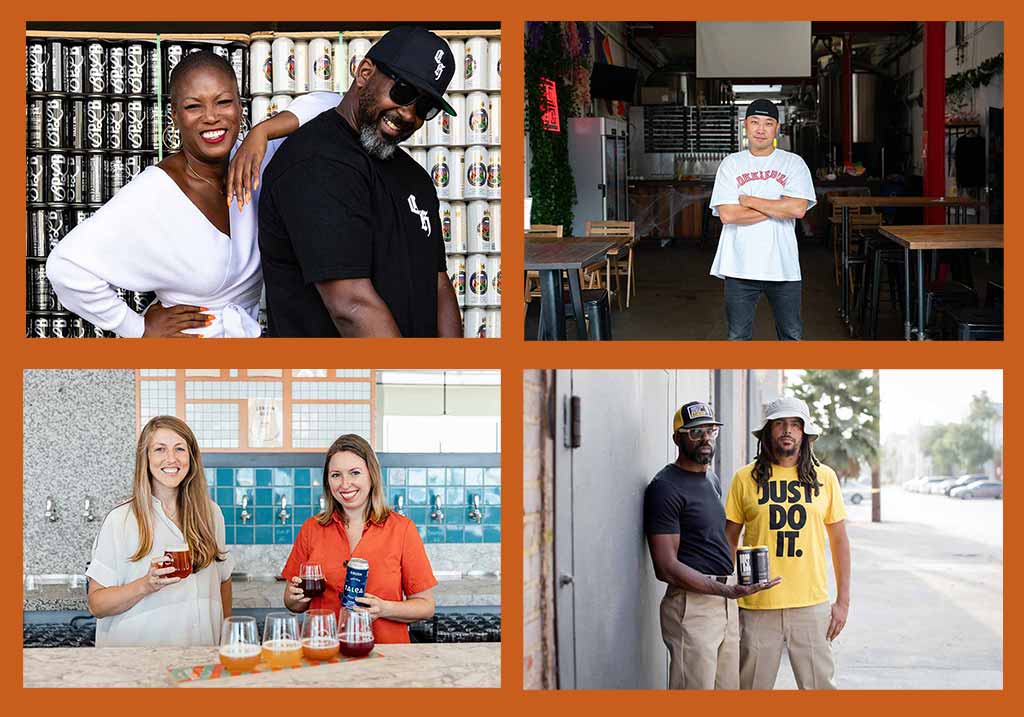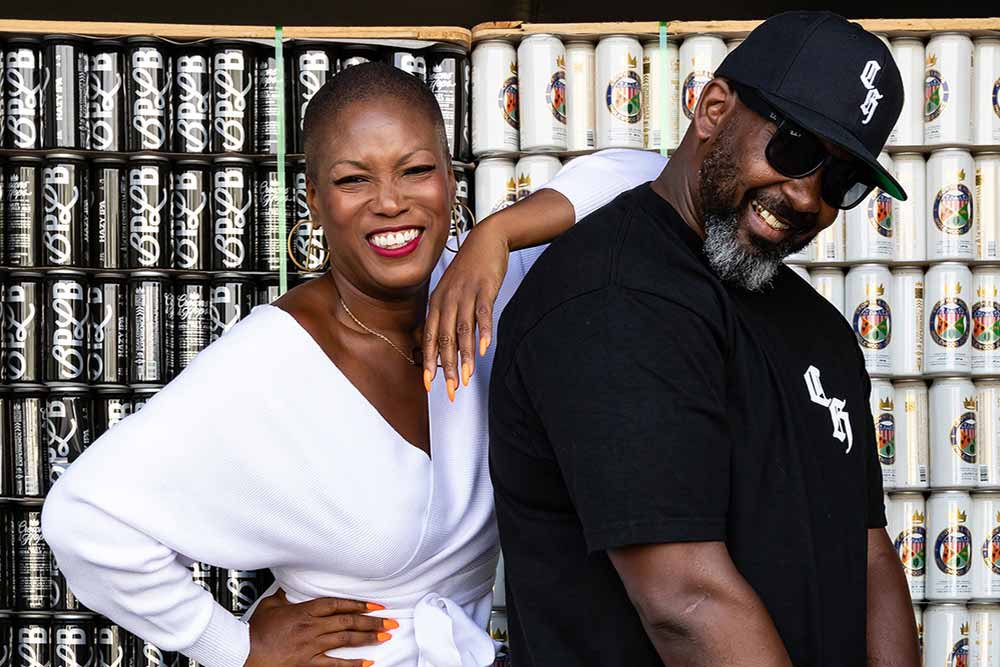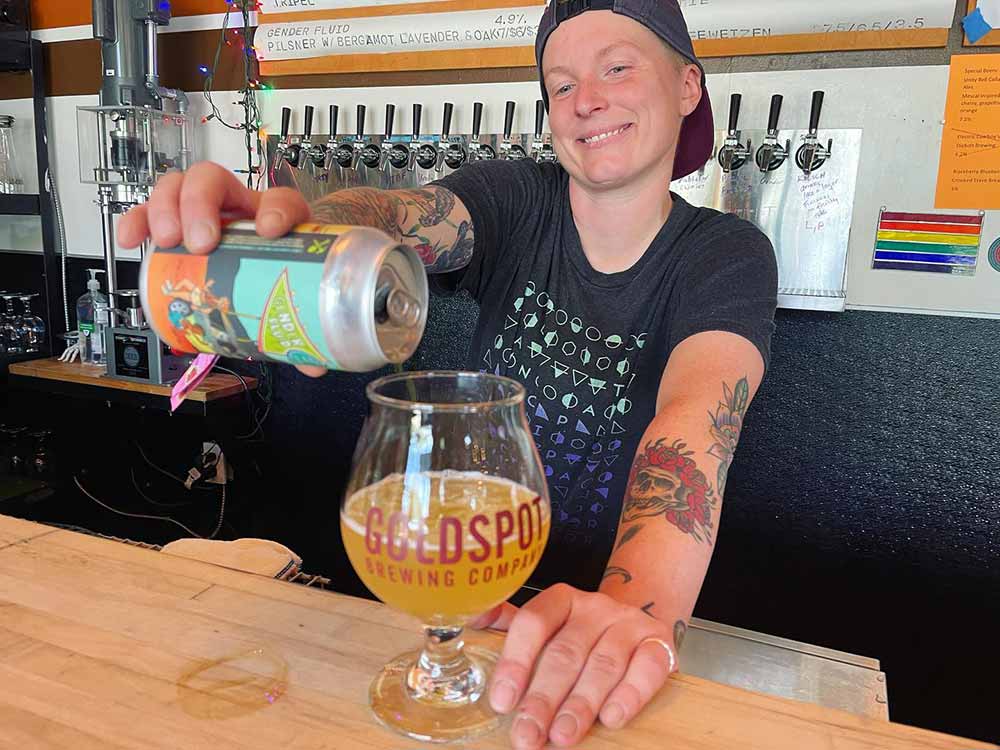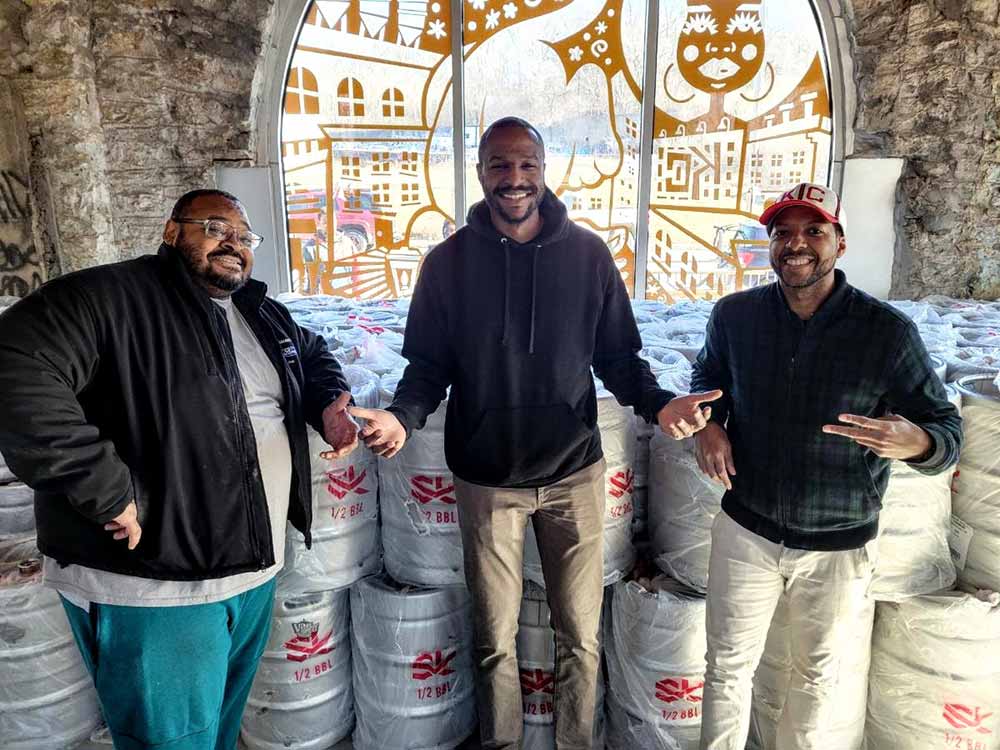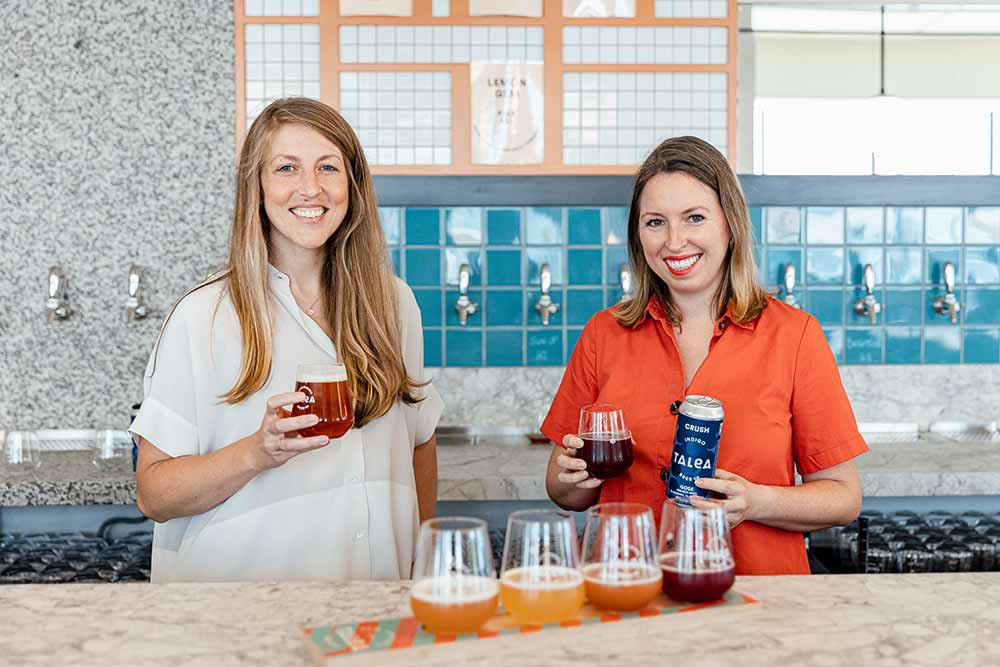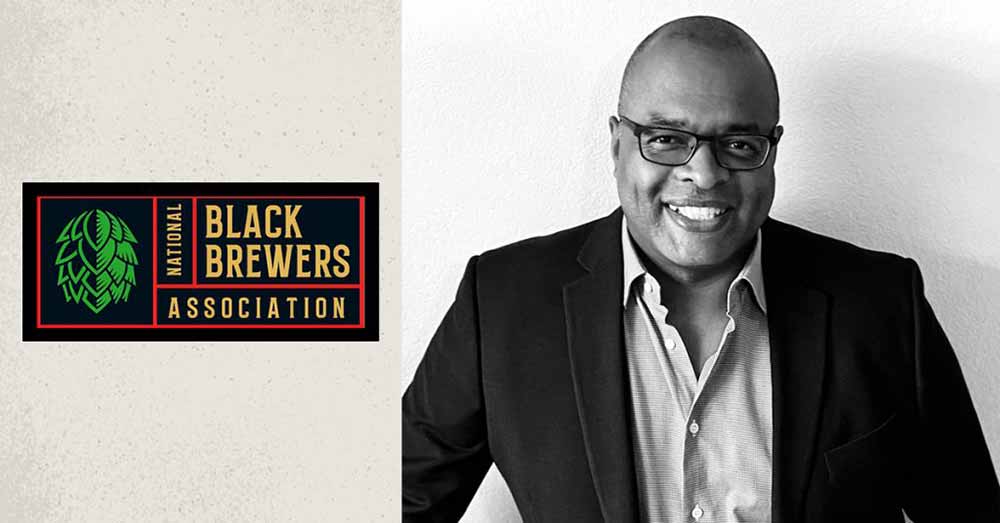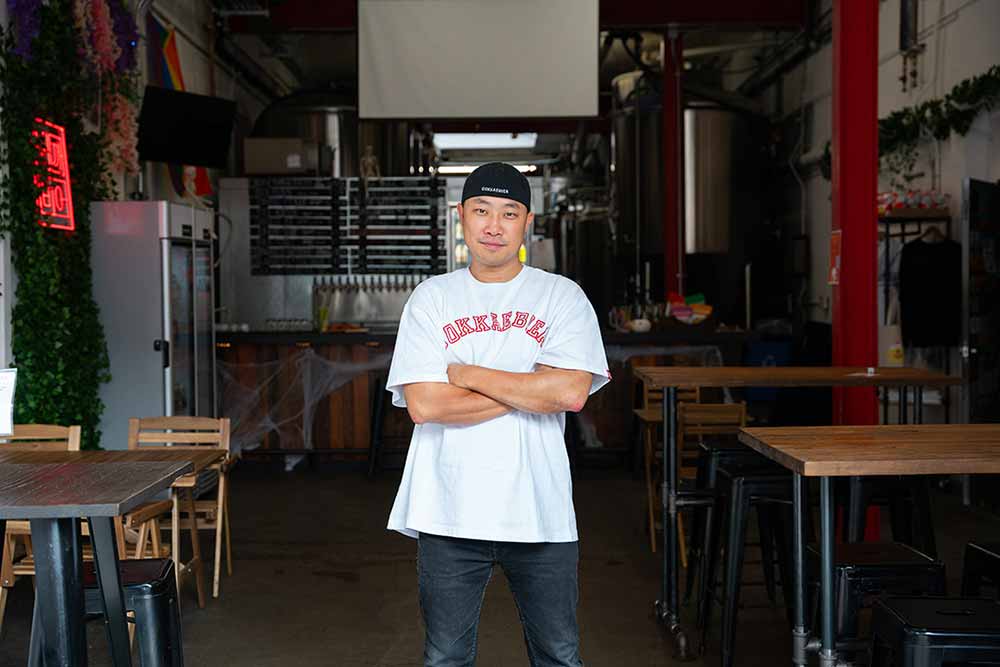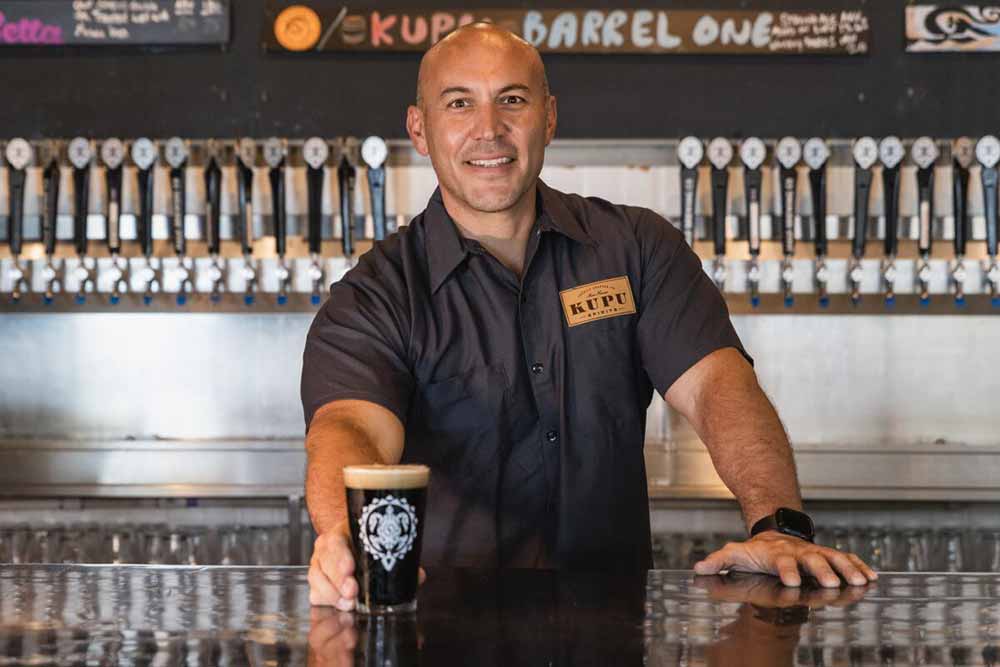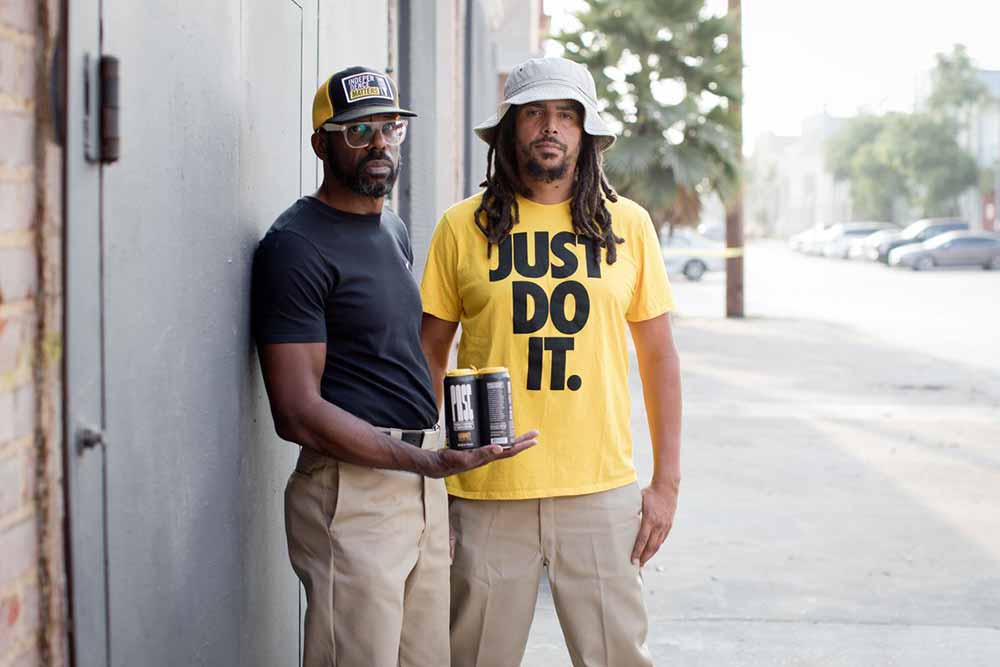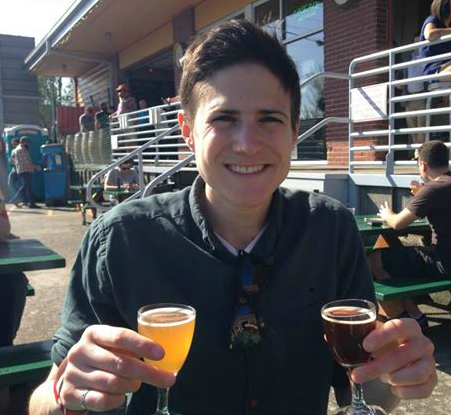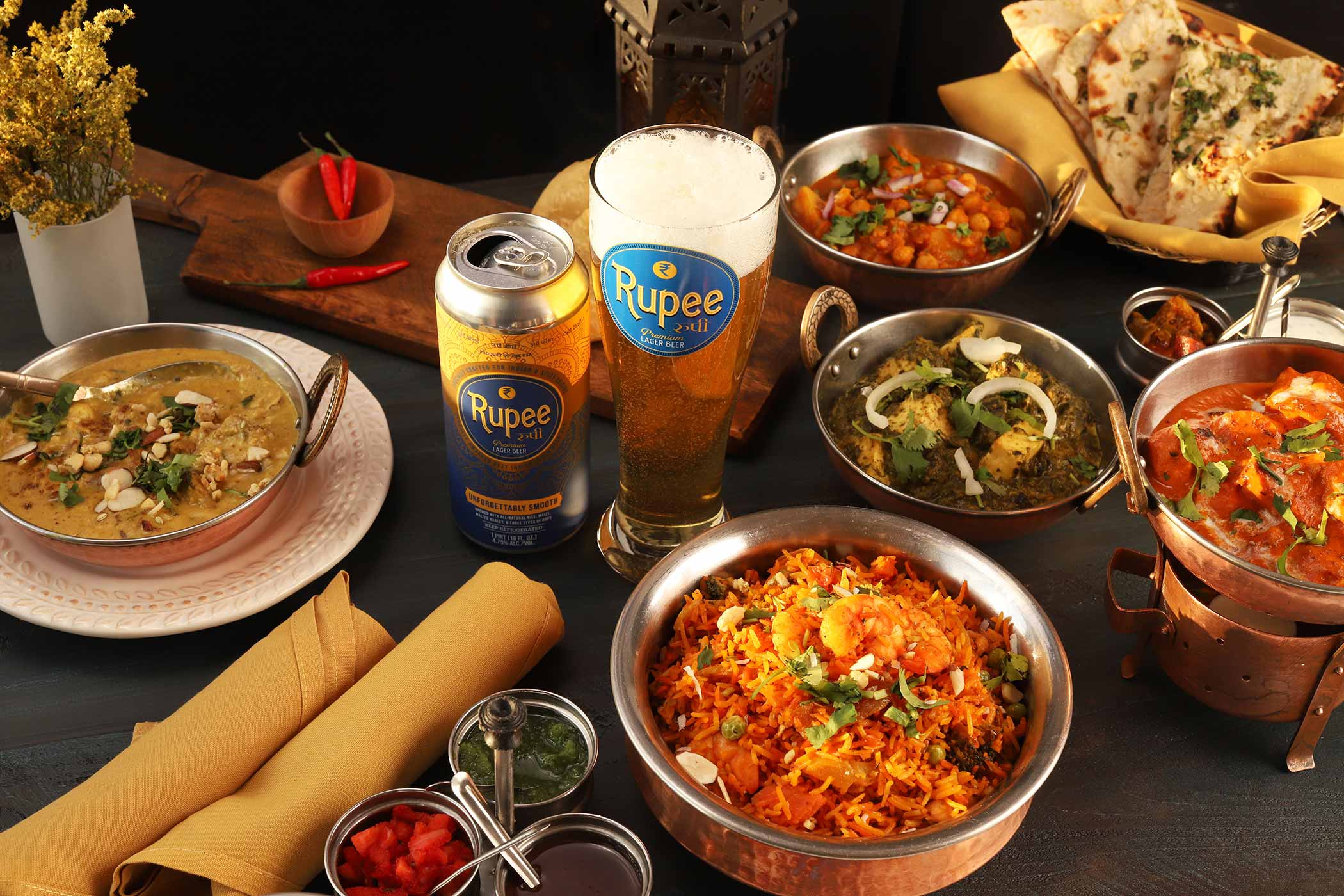Shop
The Top 15 People to Watch in Craft Beer in 2024
We cheers to you!
Looking for More?
We all spend an enormous amount of time appreciating the liquid in the can, but what about the person behind the beer? At the beginning of every year, we take a look at the trends we see driving the industry, the breweries to watch, and the people who, in our opinion, deserve the spotlight.
Our list of People to Watch in Craft Beer in 2024 highlights the voices changing craft beer for the better every day; those folx go beyond just clocking in every day and making beer.
The people mentioned here represent Black, Brown, female, Queer, South Asian, and other voices in brewing—all changing the industry not only through the beer they brew but also through the sometimes invisible work they perform each and every day.
In 2024, we’re making sure these unwritten voices become a part of everyday conversation. As you start your new year, watch how these fifteen people continue to break boundaries in the industry.
Hop Culture’s 15 People to Watch in Craft Beer in 2024
Van and Sumit Sharma
Van and Sumit Sharma
Co-Founders, Rupee Beer
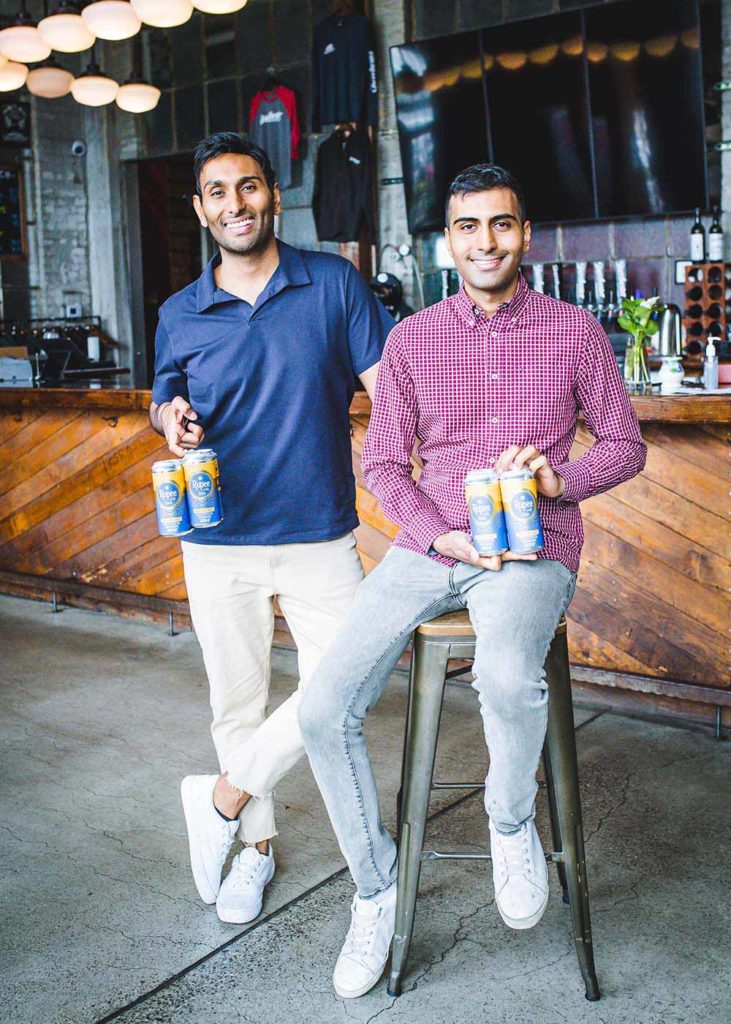
Van and Sumit Sharma, Co-Founders of Rupee Beer | Photography courtesy of Jackie Ricciardi | Boston University Photography
A beer built as the “global beer for curry,” Rupee Beer is on a mission to be the smoothest, lightest, crispest, best beer to pair with not only Indian dishes, but food from around the world.
As the third largest consumer of alcohol globally and most populated country on Earth, India remains largely left out of the conversation around craft beer, especially in America. Rupee Beer wants to change that stereotype, working to destroy myths around Indians and alcohol while bringing a delicious beer to market.
Started by brothers and sons of fifth-generation Indian restauranteurs, Van and Sumit Sharma, the now-award-winning brewery, in many ways, reflects the brothers’ heritage.
Born in West London, an area historically known to have one of Europe’s largest South Asian communities, Van and Sumit moved to Portland, ME, in the early ‘90s after their parents took a trip to the U.S. and fell in love with New England.
With a family history of over forty-five years in the restaurant business, Van and Sumit’s parents carried that legacy to the States, launching three Indian restaurants in different cities across Maine.
But it’s not a stretch to say that the Pine Tree State was very different from England.
“Ironically, in the largest city in Maine, we were still the only Indian kids in school,” Van told us. “Growing up in that space with Indian restaurants, for me, it felt as if I was the odd one out in my group of friends.”
Back in the ‘90s, Portland hadn’t yet become synonymous with words like “foodie” and “craft beer.” But even recently, with an exploding culinary and drinking scene, Van and Sumit couldn’t find a perfect craft beer designed to pair with the spicy, sweet, creamy flavors often found across Indian dishes.
So, they created one.
A beer, actually more like a currency that could become a legacy to hand down for generations.
Just like their family’s restaurants.
“Our parents weren’t doctors, they weren’t lawyers, they weren’t accountants or in sales, they were Indian restaurateurs,” Van shared with us. “Naturally, I’ve always felt I have to be an ambassador for India, especially living in a place like Maine where you have to stick up for your country and your heritage.”
Named after the iconic currency of India and seven other countries, Rupee Beer pays homage to their family and many others’ struggle to build a business despite the barriers of a predominantly white community in a predominantly white industry.
At the beginning of 2023, Van and Sumit had one SKU—the “unforgettably smooth” Basmati Rice Lager. But just last year, the brothers added two more beers to their portfolio—Mango Wheat Ale and India Pale Ale, brewed to the original style of a signature British-Indian IPA. Or, as the duo likes to say, “Rupee is putting the ‘India’ back into India Pale Ale.”
This year, the brewery also picked up Best Global Can Design in the 16oz category from the Craft Beer Marketing Awards (“The Crushies”).
Every decision Van and Sumit make with Rupee Beer has a purpose. “Anything we do or plan to make has to go back to the original reason why we made the beer,” Sumit told us. “We wanted to make a beer that pairs well with the food we grew up with, that’s the litmus test, we have to make something that stays true to that.”
Teo Hunter and Beny Ashburn
Co-Founders, Crowns & Hops
Crowns & Hops has always done things differently.
Co-founders Beny Ashburn and Teo Hunter didn’t come from a background in beer; they didn’t quit finance jobs to stoke their homebrewing passion full-time; they didn’t go to any brewing schools or take part-time jobs washing kegs on the weekend.
Hunter worked in creative production for the entertainment industry. And Ashburn cut her teeth in marketing and advertising at companies like Beats Electronics and Sony.
But that’s exactly why they’ve come into the beer industry and completely turned it on its head like a snow globe, shaking things up something fierce.
Because both believe that the status quo, the placid image of this white-washed industry that has been burned into everyone’s minds for so long, doesn’t or shouldn’t apply anymore.
The two focused on their strengths—creativity, marketing, and storytelling—to build brands and later a brewery—Crowns & Hops—that goes far beyond making beer.
Essentially, the pair “built an entire craft beer brand that sold in four states from an Instagram handle,” Ashburn told us. “I don’t know if that’s ever been done before.”
Crowns & Hops has completely disrupted the industry, fighting for racial equity while proving that Black and Brown people love beer, drink beer, and have existed here in beer since the very beginning.
Ashburn and Hunter understood they needed to build trust and consistency with people before even making one single beer. “We didn’t start with a product; we started with a brand. We didn’t start with a product; we started with a community. We didn’t start with a product; we started with visualization and storytelling,” says Ashburn.
Sure enough, layer by layer, Ashburn and Hunter started to redefine what craft beer culture looked like.
“If we’re looking at the old-school definition of craft beer, it was bearded, white men,” says Ashburn. “That excluded everyone who didn’t live in that space or in that particular age demographic.”
Today, the world is different.
“What if there is a new definition of craft beer culture?” queries Ashburn. “What if craft beer culture today is not necessarily about the brewers but about the brand in a space where you can actually see yourself?”
For example, while searching databases for license-free images, they couldn’t find one single image of a Black hand and beer. “It did not exist,” says Hunter. “Think about the significance of that. … The world didn’t even see … us in beer.”
So, using each other as models, they created imagery with Black hands and Black people—“all the scope of colors that exist,” says Hunter. “It didn’t exist, so we have to be it.”
They also started programs like the 8 Trill Pils Initiative, which raises money to provide support for Black- and Brown-owned breweries. In its first year, Crowns & Hops raised $100,000 they awarded as micro-grants to five different Black-owned brands.
And they encourage folx in the industry to shift their mindset.
“Instead of saying we’re less than 1% Black-owned breweries in this country, our goal is to achieve 13% Black-owned breweries in this country, which is the percentage of Black people in America,” says Hunter. “It’s a big goal; it’s a big number, that’s 1,500 breweries, but if they’re 10,000 Black-owned and white-owned breweries, we feel that’s achievable.”
No one gave Ashburn and Hunter a place to call their own in craft beer; they made it.
They made it so that others following behind could have that sense of community, feeling empowered to disrupt and create their own.
“As we always say: If there’s no room at the table, build a bigger f**king table,” says Ashburn.
We know without a doubt that Hunter and Ashburn will continue to shake things up in 2024, including opening up their own brick-and-mortar in Inglewood. We’re hard pressed to find two people more dedicated to disrupting the industry than Hunter and Ashburn.
Kelissa Hieber
Owner and Head Brewer, Goldspot Brewing
It’s noon on a Thursday, and a group of white straight cis-men gathers in a low-ceilinged taproom in the Northwest corner of Denver, CO. They’re celebrating a bachelor party. Perhaps they notice the rainbow transgender flags hanging on a string above the bar. Maybe they see the sign next to the taps of a cowboy with a pistol that states, “We’ll have no misgendering in this saloon, partner,” or the bright yellow tin tacker that says, “Danger WoMen Brewing,” with the “Wo” drawn in front of “Men.” Have they seen the pink unicorn piñata with a gold horn? They’ve certainly noticed their bartender, the smiling, short-haired, tatted girl, giving them beer after beer. That’s Goldspot Owner and Brewer Kelissa Hieber, a constant in the brewhouse or sometimes behind the bar.
Walk into the taproom any given day, and you’ll find an array of people as colorful as the New Progress Pride flag. In other words, Goldspot has gained recognition as a welcoming, safe taproom for all in the community. But this day, Hieber’s slinging in her brewery to your more typical craft beer demographic.
“I’m the best person to be with them,” says Hieber, who mentions that once they found out she owned the place, they kept telling her, “This is the coolest f**king place ever. That’s so cool [you own a brewery]. You’re so young and so dope.”
Six beers in, “they were just having a blast and were like, ‘I’m going to tell every single person ever to come here,” she laughs. “It was such a night. We were just connecting with people, and that was really nice.”
That’s how it goes at Goldspot, a one hundred percent Queer- and woman-owned brewery in Denver.
People of all ages, races, identities, genders, and more come into Goldspot because they know they’re going to get a damn good beer and they’re going to feel safe drinking it.
At Goldspot, you’ll feel seen, cared for, and golden.
Something Hieber, who VinePair recently named its Next Wave Awards Brewer of the Year, has sought to bring to craft beer with Goldspot.
The brewery is “an inclusive space that people can just hang out in … a place to actually have a real community,” she told me.
At Goldspot, you share common respect and a common love over one thing: beer.
“I have no idea what their political beliefs are … but at least in our space, it’s pretty gay, obviously, but beer can just be that bridge point,” says Hieber.
Beer speaks as the universal language at Goldspot. Those like Gender Fluid, an Italian pilsner that initially started as a beer to raise money for one of the Goldspot bartender’s gender-affirming surgery. Matching the amount raised from $1 per pint poured, Hieber morphed that beer into a series, donating to a different organization every time, such as Denver Community Fridges or the Transformative Freedom Fund.
Or This Beer F*cks, a collaboration with the food truck The Easy Vegan. The session IPA with passion fruit donated ten percent of all proceeds to LGBTQIA+ organizations fighting for Queer rights in Texas, Tennessee, and Florida.
And weekly events not only engender community but also bring in tens of thousands for local organizations.
Hieber laughs, “My dad always jokes that you’re not an NGO. ”
But that doesn’t matter. And Hieber will never stop developing new ideas to support intersectional rights.
Most recently, Hieber teamed up with Everywhere Is Queer Founder Charlie Sprinkman to start the Out Loud Beer Project, a collaborative beer recipe open to anyone to brew as long as they donate twenty-five percent of all profits to Everywhere Is Queer and a Queer non-profit of the collaborating brewery’s choice.
Proudly Queer- and woman-owned, Goldspot does not tolerate racism, bigotry, homophobia, xenophobia, or any hate in general.
In my humble opinion, we could seriously use thousands more Hiebers and Goldspots in the industry.
Kemet Coleman, Woodie Bonds, and Elliott Ivory
Co-Founders, Vine Street Brewing
When Vine Street Brewing Co. celebrated its grand opening on June 30th, it became Missouri’s first Black-owned brewery, bringing beer to Kansas City’s famous jazz neighborhood.
Co-founders Kemet Coleman, Woodie Bonds, and Elliott Ivory opened the new two-story taproom, brewhouse, and beer garden in the historic 18th & Vine Jazz District to be a place of community and inspiration.
Fusing the past with the present, Vine Street, which recently made it to the final rounds of Brewbound’s fifteenth Pitch Slam competition, honors Kansas City’s musical heritage through one of America’s most classic pastimes—drinking a glass of beer.
Traditionally a musician, rapper, music producer, and performer, Coleman got into craft beer to make a little more income on the side.
“I didn’t want to work at a desk job, and I didn’t want a boring job,” Coleman told us. Making a short list of what he called “really cool places in Kansas City that I believe in as a brand,” Coleman landed on Boulevard Brewing. Plus, it didn’t hurt that it was one of the only places to call him back.
Coleman wanted to open a brewery but wasn’t a brewer himself, so he paired up with Woodie Bonds, known around town for starting the hip-hop beer festival Hip Hops Hooray, who brought in the third co-founder, Elliott Ivory. A former Fortune 100 company engineer, Ivory started homebrewing as a hobby with one of his old fraternity brothers, getting good enough to start his own brand—Wiz Brewing.
Together all three are infusing history and heritage back into Kansas City.
Much like we talk about wine or even some beers like wild ales as having terroir, getting its essence from the characteristics of a particular place, Vine Street reflects its neighborhood in more ways than one.
Located in the 18th & Vine Street Historic Jazz District, the brewery pays homage to one of the few global Jazz towns recognized by the United Nations, shares Coleman.
While the area thrived through the 1920s, during the 1940s, suburbanization, expansion, and redlining cut the heart out of the cradle of Jazz.
Housed in a 150-year-old building, Vine Street’s taproom was abandoned for forty years before Coleman, Bonds, and Ivory decided to turn it into a brewery.
Everything from the custom piano wall made with reclaimed wood from the West Bottoms to the color palette—a mixture of red, black, green, purple, and gold—holds special significance.
According to Coleman, the red, black, and green represent Africa, the birthplace of beer, a “nod to the Motherland,” he says.
The purple, green, and gold depict New Orleans, the birthplace of Jazz and where many musicians migrated from to come to Kansas City during Prohibition for work, says Coleman.
The colors “represent the diversity of America and the beauty within this country,” says Coleman.
Plus, the beer speaks volumes, too. We named the brewery’s flagship Jazzman dark lager one of “The Top 12 Beers We Drank in July 2023.”
It’s a little poetic that Coleman, Bonds, and Ivory opened Vine Street with a dark lager, a style often forced to hide in the shadows while its lighter-colored brethren thrive. Striving to educate and open people’s minds with Jazzman, Vine Street itself makes a statement.
Now a part of the only one percent of Black-owned breweries in the country (Brewers Association) and the only one in Missouri, Vine Street joins a growing group of Black and Brown brewery owners seeking to balance the industry’s scales.
“When people mention we’re the first Black-owned brewery, I do think that is a challenge we’ll have to overcome in Missouri and Kansas City,” says Coleman. “But it is also an opportunity for a whole new perspective to enter this arena that might be refreshing for everybody. I see it more as an opportunity than a challenge.”
LeAnn Darland and Tara Hankinson
Co-Founder, TALEA Beer Co.
We first met TALEA Beer Co. Co-Founders LeAnn Darland and Tara Hankinson before they even had one brick-and-mortar spot to their name. The all-woman and veteran-owned brewery consciously decided to cultivate an inclusive culture, from their packaging meant to attract all types of consumers regardless of gender to their incredibly friendly spaces—taprooms in Williamsburg and Cobble Hill that opened in 2021 and 2022, respectively.
In 2023, a bit of a banner year for TALEA, Darland and Hankinson continued to expand their brand, launching two new locations in Bryant Park and the West Village. The latter, on Christopher Street, sits two blocks away from The Stonewall Inn, the site of the Stonewall Riots, considered by many as sparking the Gay Rights Movement in America.
Retail sales also increased dramatically for TALEA, growing to 1,000 accounts, including some big hitters like Whole Foods and Trader Joe’s. As did production, topping out at 5,500 bbls compared to 1,500 in 2022.
Perhaps most impressive is the duo’s uncanny savviness and prowess to stay on top of the pulse of craft beer, collaborating with a host of brands, including Pine & Polk, Brooklyn Brew Shop, TCHO Chocolate, Runner’s World, OLIPOP, Fishwife, and more.
TALEA captured our hearts a long time ago, but this year, Darland and Hankinson have grown leaps and bounds, and we only expect them to warp drive in the year to come.
Kevin Asato
Executive Director, National Black Brewers Association
The buzz rose from a low rumble to an ear-numbing roar as more and more people crowded into Slim & Husky’s on Broadway in Nashville, TN.
With ice tubs of beer to our left and pieces of pizza in front of us, I strolled over to the beer, picking out a Peoples Beer from Oak Park Brewing Company. The American light lager brewed by Oak Park Brew Co. Founder Kevin Johnson nods to Peoples Brewing Co., the first African American-owned brewery in the country started by Theodore Mack Sr.
Sipping on the historic beer, I looked around. I saw people laughing, intensely chatting, and even crying. The air was so charged that, as Michael James Jackson Foundation Founder and Chair Garrett Oliver later said, “We shorted out the air conditioning; it cracked up out of the room and destroyed everything.” This bottle share celebrating the official formation of the first-ever National Black Brewers Association (NB2A) would be one of the most impactful events I attended at the Craft Brewers Conference.
It’s also where I met Kevin Asato, the first executive director of the NB2A. The thirty-year beverage industry veteran had a huge task ahead of him in 2023.
For years, not a single organization existed to help African American brewers and brewery owners try and turn that tide of equality in craft beer. In an industry that made nearly $29 billion in beer sales in 2022, the BIPOC community only enjoyed a tiny slice. Asato shared with me that around 117 Black- and Brown-owned breweries exist in the country.
“Black brewery ownership should be more representative of the demographic of Black people in the United States,” Asato told me.”We believe ownership is one of the metrics that not only can be measured, but quite frankly, is something that generational wealth can be derived from, passed down, and carried on through the Black community for generations to come.”
Asato’s goal is for the NB2A to be that “collection point or hub,” as he called it to “bring those resources together for the Black community and actually continue to give them a voice.”
Just last year alone, Asato stayed pretty busy. He oversaw a second coming of the Black is Beautiful initiative (Black is Beautiful Volume 2), which aimed to raise $1M for the NB2A, celebrated the inaugural Black Brewers Day, and announced the first-ever NB2A conference, which will take place immediately following the Craft Brewers Conference in Las Vegas from April 24-25, 2024.
“My job is to do [BIPOC brewers and brewery owners] right,” Asato told us. “To bring their passions to life the right way, the sustainable way, and to truly create that foundation and structure that does allow for it to live on for years and years down the road.”
Mission accomplished in year one! We can’t wait to see what Asato and the entire NB2A accomplish in 2024.
Alex Kidd
Founder, Don’t Drink Beer, Malt Couture Podcast
Back in May, I noticed a new Instagram post from Hop Culture Founder Kenny Gould (@thekennygould).
???? IMPORTANT ???? It has been a while since I’ve posted about beer, as I’m still in the industry but have been doing a different type of work since I sold Hop Culture in 2020. However, I just found out that someone else who treasures the beer community needs help. Alex Kidd, aka @dontdrinkbeers, was recently diagnosed with stage 4 colon cancer, and a GoFundMe was set up to help him and his young family with medical expenses. I think it’s pretty telling that Alex didn’t set this up himself—it was set up for him by other people in the beer community.
On Saturday, I’m starting a 330-mile bike ride from Pittsburgh to DC for my last set of MBA classes, and I’m dedicating this trip to Alex’s fund.
You can find the link to the GoFundMe in my bio, and I invite everyone who reads this to join me in supporting Alex and his family. Donate $.10 per mile I’m riding, or find some other number that’s meaningful for you. Do it in honor of your favorite brewer. The beer community wouldn’t be what it is without @dontdrinkbeers, and I’m sending all best wishes to Alex for a full recovery.
An icon in the community, Kidd is perhaps most well known for his witty social media account @dontdrinkbeers, fervent Facebook group Barleywine Is Life, and humorous, entertaining podcast Malt Couture. I didn’t personally know too much about Kidd, but as I started to dig deeper, I learned that he has contributed to craft beer in so many different ways that go beyond his cultural zeitgeist.
In one week, his fundraising efforts helped raise $70,000 for the families of Breonna Taylor, Elijah McClain, and George Floyd.
So when Kidd needed help for himself and his own family, the craft beer community came out in droves. Posts like Gould’s littered social media for weeks. Everyone from PorchDrinking to BeerAdvocate, The Full Pint, and so many in between reached out to their own fanbases asking for support.
To date, Kidd’s GoFundMe page has raised almost $400k of a $420k goal from over 3.3k people.
I think it speaks volumes about Kidd’s character that so many people across the industry immediately mobilized to help someone they hold in high regard.
Despite his diagnosis, Kidd has still remained active as much as he can, even joining Craft Beer & Brewing to share his yearly picks for the best beers of 2023.
Learn More About How You Can Help!
Youngwon Lee
Founder, Dokkaebier
While Dokkaebier has actually been nomad brewing since February 2020, founder Youngwon Lee took over the Federation Brewing space in the Jack London neighborhood of Oakland last year.
The Korean-owned and -themed brewery includes beers with Korean ingredients, a nod to Lee’s heritage.
Born in Korea, Lee has lived all over, moving to Guam, New Jersey, and then California for school before taking time off to go back to Korea to take care of his grandmother. Back in Korea, he discovered a love for wine and eventually beer, working at the Korean-owned brewery The Booth when they opened an outpost in California.
But when The Booth folded in the U.S., Lee wanted to continue to find ways to bring his culture to drinkers.
Named after dokkaebi (도깨비), shape-shifting creatures from Korean folklore, Lee’s brewery mimics the dokkaebi’s love of eating and drinking.
Each beer comes with a playful whimsy and spirit for experimentation.
For instance, when my wife and I visited, we loved the flagship Kimchi Sour made with ginger, gochugaru peppers, and a lactic culture from two-year-old homemade kimchi. We also enjoyed the LP Witbier, a cloudy wheat beer with two different peppercorns and lemongrass.
Dokkaebier is a brewery with heart and soul. To see Lee committed to sharing a piece of his culture with others through beer is something we could all eat and drink up a little more of these days.
Garrett Marrero
CEO and Co-Founder, Maui Brewing Company
In August 2023, a freak and deadly fire consumed Lāhainā, HI, destroying businesses, breweries, and homes and taking more than one hundred lives.
In a short time, the largest and oldest brewery on its namesake Hawaiian island, Maui Brewing Company, responded with its Kōkua project.
“It’s no secret MBC is dedicated to the community; we answer calls of need,” Maui Brewing Company CEO and Co-Founder Garrett W. Marrero told us.
An initiative started by MBC, “the Kōkua project will be one beer, brewed by many, to support our Maui ‘Ohana who have been affected by this tragedy,” according to the official website.
Much like Black is Beautiful, the Kōkua project provided an open recipe for a style—session IPA—to anyone who wanted to brew the beer, requiring only that any participant donate one hundred percent of the proceeds to local charities.
Breweries across the world signed on representing all fifty states, along with Canada, Japan, Germany, the Philippines, New Zealand, and more.
Since starting the project, Maui Brewing Co. announced on December 21, 2023, that 700 different breweries have helped raise over $1.5 million.
Proof of the initiative’s success, the U.S. Open Beer Championship even recently created two separate categories just for Kōkua beers—Kōkua IPA and Kōkua Session IPA.
Derived from the Hawaiian word for selfless or self-sacrificing help, the Kōkua project started by Marrero and Maui Breiwng proved that the collective power of the craft beer industry can have huge ripple effects.
Craig Bowers and Samuel Chawinga
Co-Founders, People’s Republic of South Central
Winners of Brewbounds fifteenth Pitch Slam competition, the People’s Republic of South Central (PRSC) Co-Founders Craig Bowers and Samuel Chawinga impressed a panel of industry experts with their goal to bring craft beer to South Los Angeles.
“Craft beer might be able to make a meaningful contribution to the overall conversation,” Bowers outlined in his live-broadcasted four-minute pitch. “We made a pledge that seventy-five percent of our employees will live within two miles of the brewery.”
Bowers and Chawinga’s pillars will help ensure that their business will invest directly back into their community. In his presentation, Bowers also mentioned paying a living wage to the brewery’s employees and applying for B-Corp certification.
Although PRSC’s beers have been around for several years, the founders plan to take a big step this year, opening a new venue in south central Los Angeles that will include three restaurants, a coffee shop, live performance space, and indoor and outdoor spaces.
While other California cities such as San Diego and Sacramento have seen considerable craft beer growth, Bowers pointed out that PRSC’s target neighborhood in LA has a dearth of breweries.
“We’re trying to make this a lifestyle brand for the entire neighborhood, where people can get invested in the brand overall and ride with us,” Bowers shared in his presentation.
We applaud PRSC’s mission and are excited to see the brewery grow in 2024.

